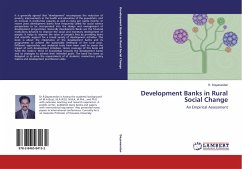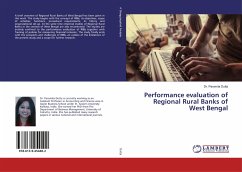It is generally agreed that "development" encompasses the reduction of poverty, improvements in the health and education of the population, and an increase in productive capacity as well as rising per capita income. In recent years development banks have frequently called for social science perspectives to be incorporated into the design and management of development programmes. Generally development Banks are the financial institutions devoted to improve the social and monetary development of people. It helps to improve the value of people's lives by providing loans and scientific support for a broad variety of development activities. This book is about the importance of the development banks and its programmes to achieve the sustainable livelihood of the rural poor. Different approaches and analytical tools have been used to assess the impact of such development initiatives. Hence coverage of this book will fulfill the readers thirst of knowledge towards the development banks and its strategies to achieve their intended goals. The book has been so designed as to serve the requirements of of students, researchers, policy makers and development practitioners alike.
Bitte wählen Sie Ihr Anliegen aus.
Rechnungen
Retourenschein anfordern
Bestellstatus
Storno








